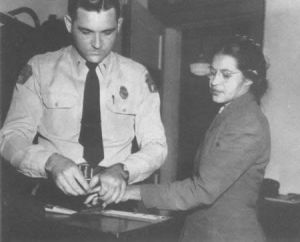(单词翻译:单击)

INTRO: President Clinton delivered his annual state of the union message this past week. Now our wordmasters rosanne Skirble and Avi Arditti take another listen — not so much as to what he said, but how he said it.
TAPE: CUT ONE — CLINTON
"My fellow Americans, I stand before you tonight to report that the state of our union is strong. [applause]"
AA: It's written in the Constitution that the president shall "from time to time give to the Congress information of the state of the union." I'm Avi Arditti.
RS: And I'm Rosanne Skirble. The Constitution does not specify a time or fomat — presidents used to give their report in writing. But it's evolved into a speech to a joint meeting of Congress. And, that's where Mr. Clinton appeared Tuesday night — in front of the same House members who impeached him last month, and the senators who now sit in judgment of his future.
AA: Wayne Fields is an expert in political rhetoric and director of the American Studies Program at Washington University in St. Louis, Missouri. He's written extensively about the the history of the State of the Union address. And what impressed him this time, he says, was the way Mr. Clinton maintained a relaxed composure.
TAPE: CUT TWO — FIELDS
"He did it by the mixture of formality and informality, I think, which is something that Ronald Reagan, who delivered similar State of the Union messages, was very good at. That is to say that there were the ad libs, the moment when he [Clinton] broke in after talking about equal pay and having applause on both sides, he said something about how encouraging it was that there was more balance, and laughed."
TAPE: CUT THREE — CLINTON
"[applause] That was encouraging, you know. There was more balance on the seesaw. I like that. Let's give them a hand. That's great. [applause]"
TAPE: CUT FOUR — AA/FIELDS
AA: "If there's one or two phrases from the president's speech that you think would stand a chance of making it into history books one day, what would they be?"
FIELDS: "I think that the ones that will probably be the most memorable for historians after the fact will be the ones that are the most typical. I think those are the ones about the more perfect union, which starts when he says this is the last State of the Union message of the 20th century, and then focuses almost wholely on the constitutional theme of what it means to be a more perfect union."
TAPE: CUT FIVE — CLINTON
"We must all be profoundly grateful for the magnificent achievements of our forbearers in this century. Yet perhaps in the daily press of events, in the clash of controversy, we don't see our own time for what it truly is — a new dawn for America."
TAPE: CUT SIX — RS/FIELDS
RS: "Do you feel that when historians do look back, they will be more captured by the context in which the president found himself or about this message he delivered?"
FIELDS: "When they look at the speech, it will probably be that it was given under these circumstances. On the other hand, there are a few things that are important if for no other reason than it is the last of these in the 20th century. And, I think one of the most significant, is a symbolic thing and that is the most prominent reference was to the civil rights movement. It was for the struggle of civil rights in America."
TAPE: CUT SEVEN — CLINTON
"In a very real sense this journey began 43 years ago, when a woman named Rosa Parks sat down on a bus in Alabama and wouldn't get up. She's sitting down with the first lady tonight, and she may get up or not as she chooses. (applause)"
AA: From the State of the Union address that President Clinton delivered to Congress and to the American people Tuesday night.
RS: And now, a message to our audience: We've been getting lots of entries for the Wordmaster Name the Next Decade Contest.
AA: The object, we remind you, is to suggest a name for the first ten years of the 21st century. Everyone who enters wins a VOA souvenir, but the better the entry, the better the prize. The deadline is March 2.
RS: With Avi Arditti, I'm Rosanne Skirble.
词汇点津:
今天的《词汇大师》探讨了美国前总统克林顿的一次演讲。
演讲涉及平均分配equal pay的问题,克林顿称美国正迎来新的黎明a new dawn for America
其实,讲话背后涉及深远的民权问题struggle civil rights movement在此向先人Rosa Parks致敬。
Rosa Parks罗莎·帕克斯,一位美国黑人民权行动主义者,美国国会后来称她为现代民权运动之母。
Rosa因为在亚拉巴马州(Alabama)蒙哥马利(Montgomery)市的城市公交车上拒绝听从公车司机詹姆斯.F.布莱克(JamesBlake)的命令,向一名白人男子让座,在下车后即被捕。这起非暴力反抗的行为引发联合抵制蒙哥马利公车运动,一场大规模反对种族隔离的运动,并最终神话般引发了美国50-60年代的黑人民权运动。此外,这使参与联合抵制的马丁·路德·金开始在民权运动中引起注目。2005年10月25日,该事件的女主角Rosa Parks,在底特律(Detroit)的家中去世,享年92岁。


